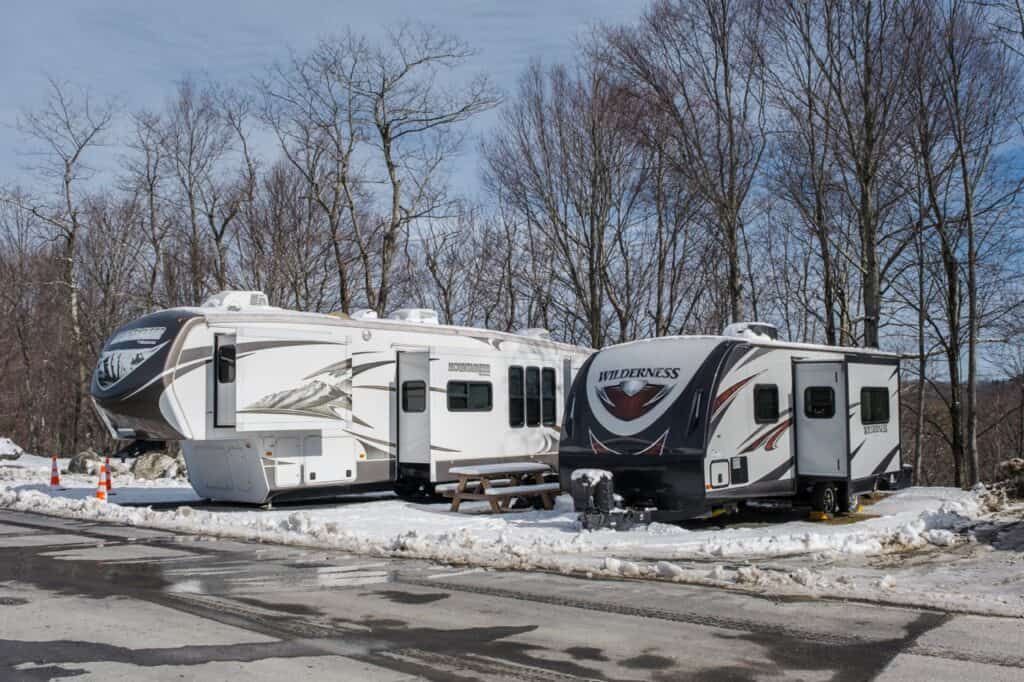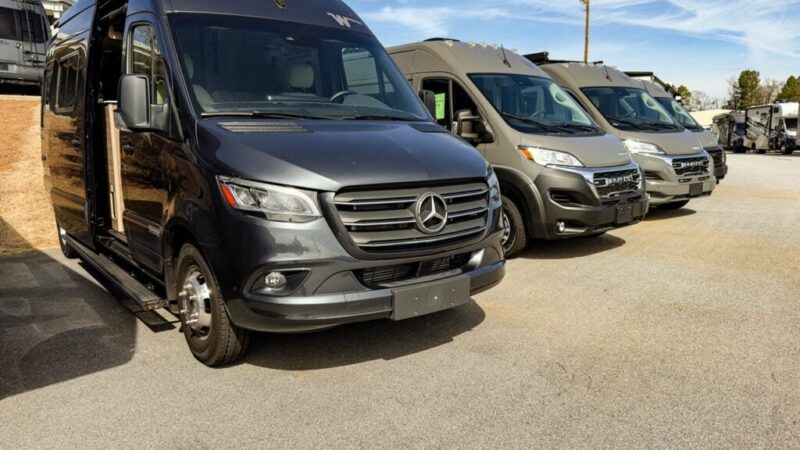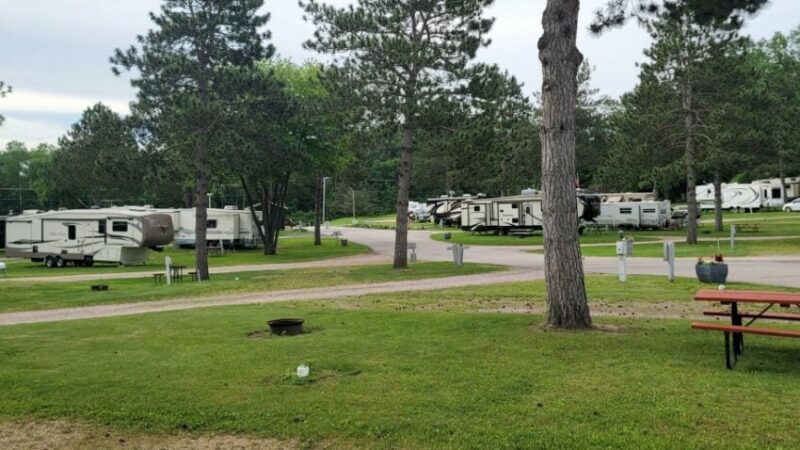Winter Camping Warmers for RVers
Winter is in full swing, which means a lot of RVers out there have put their rigs away for the season. However, there are a brave few of us who still have our motorhomes and trailers out and want to enjoy some winter camping.
Of course, doing so means you do have to go in prepared. Lucky for you, my family has done enough cold weather RV traveling that we know exactly what to bring along on such trips. Following are some of our favorite RV winter camping warmers, with an emphasis on gear that will help keep you cozy during your cold-weather RV travels.
Heated Camp Chair Cover
Relaxing outside on a chilly evening is one of the joys of RV life, but even with a fire pit blazing nearby, sitting in the cold can quickly sap your warmth—especially on the parts of you facing away from the fire.
A heated camp chair cover like the Chaheati MAXX Heated Add-On Seat delivers portable warmth powered by a USB battery pack. It fits over most standard folding camp chairs and provides up to six hours of heat along the seat and back (with three temperature settings to choose from), ensuring you can enjoy the outdoors without shivering. MSRP: $79.95
Hand Warmers and Heated Insoles
When that chilly weather rolls in, your fingers and toes will likely be the first to notice it. You don’t want to find yourself losing hand dexterity or walking ability due to the cold, so we recommend keeping all your digits warm with these two types of items:
- Hand warmers: Hand warmers are compact and affordable, and they’re total lifesavers for winter camping. Disposable options like HotHands Hand Warmers (available at retailers nationwide) are great for short-term use—simply toss a few into your gloves or jacket pockets for instant warmth during outdoor activities—while reusable models like OCOOPA’s Rechargeable Hand Warmers are more eco-friendly and double as portable power banks for charging your devices, meaning they continue to offer value year-round. MSRP: $39.99
- Heated insoles: Of course, if you’re going to keep your hands warm, you really should give your feet the same treatment, especially if you’ll be doing any hiking or simply walking around camp in freezing temps. This is where heated insoles come into play. Look for battery-operated options like these from Gerbing Heated Clothing, which feature adjustable heat levels and are controlled with a key fob. MSRP: $139.99
Heated Travel Mug
When it’s freezing outside, the last thing you want is your coffee or tea going cold. A heated travel mug, such as the Ember Temperature Control Smart Mug, is a sleek option that keeps your drink at exactly the right temperature for up to 80 minutes on a full charge, or all day long as long as it’s placed on the included charging coaster.
This mug is ideal for long drives, cozy mornings in your RV, and those late-night chats around the campfire. You can even control it with a smartphone app! MSRP: $149.95
Heated Freshwater Hose (or Heat Tape)
Frozen water lines (and the potential damage they can cause) can ruin a winter camping trip. Since you can’t exactly winterize your lines while staying in the rig through the cold season, you’ll want to find other ways to keep your water supply functional even in sub-freezing temperatures.
One option is to invest in a heated freshwater hose like the Camco Heated Drinking Water Hose, which ensures the water won’t freeze on its way from the spigot to your RV. With an MSRP beginning at $180.99, that’s a pretty expensive option though. That’s why a lot of people will instead opt for an electric heating tape, which costs a fraction of the price and can be wrapped not only around the hose itself, but also the spigot and above-ground piping.
With the heated hose, you’re mainly paying for the convenience of not having to wrap the heating element yourself; it’s already built-in. With the heat tape, you get some additional flexibility in how you use it, but it is somewhat of a chore to both set up and put away.
Tank Heater Pads
Likewise, protecting your RV’s water tanks from freezing is critical. A cracked tank is no fun to deal with at the best of times, and you REALLY don’t want it to happen when it’s frigid outside.
Luckily there are adhesive tank heating pads like these that attach directly to your holding tanks and keep them above freezing. They’re relatively easy to install if you have some basic experience with 12-volt RV battery wiring, and when you’re regularly camping in the coldest weather conditions, they offer a certain peace of mind that’s hard to put a price on.
For RVers who spend most of their time off-grid, 12-volt models powered by your RV battery are an excellent choice.
Weather Radio
In winter, staying well-informed about changing weather conditions is essential. After all, you never know when you might need to dodge an incoming blizzard. The key here is have a method for keeping up with weather forecasts even if your power goes out (or you’re camping without hookups). For this reason, we highly recommend carrying a weather radio in your RV.
A reliable model like the Midland WR120B Weather Alert Radio provides up-to-date alerts for your area, helping you prepare for storms, icy roads, or other hazards. MSRP: $39.99
Midland also offers models that include flashlight and power bank features, making them even more versatile additions to your winter camping kit.
Mr. Heater “Buddy” Propane Space Heater
When boondocking in winter, you don’t necessarily want to kick on your RV’s furnace too often, as it will eat through the propane supply in no time flat. We find that a small, portable propane heater like the Mr. Heater “Buddy” heats the space nicely while using much less propane. MSRP: $129.29
This heater is designed to be used indoors—and it even has safety mechanisms in place, such as tip-over and low-oxygen shut-off sensors—but you do need to keep in mind that having a cracked window nearby to keep oxygen flowing is essential to your safety. You’ll also want to be sure your carbon monoxide detector is working properly, just in case.
Ceramic Space Heater
When we’re staying at campgrounds with hookups, running a ceramic space heater (or two) has been a game-changer for us. Not only can we conserve on propane by not running the furnace nearly as much, but they also operate fairly quietly, which is a nice bonus.
Models like the Lasko Ceramic Space Heater provide consistent, adjustable warmth without depleting your propane supply. We like that it features safety features like overheat protection and a tip-over safety switch for added peace of mind.
Dehumidifier
While people in sticks-and-bricks homes tend to prefer adding humidity to the air in the dry winter weather, we RVers struggle with the condensation that constantly forms on every possible indoor surface, which could lead to mold and mildew—or worse, water damage in the walls—if it goes unaddressed.
To keep that condensation from taking over, we like to run a dehumidifier like the Ivation 13-Pint Dessicant Dehumidifier, which keeps the humidity level within a small range you set, gathering all that ambient air moisture and collecting it in a small reservoir that you have to dump outside from time to time.
The nice thing about this particular model is that it gently outputs heat while it runs, enough to keep a small space cozy at night. Win-win! MSRP: $229.99
Thermal Blackout Curtains
Windows are a major source of heat loss in RVs. Thermal blackout curtains such as these from NICETOWN help trap warmth inside while also blocking out early morning light. They’re easy to install and make a noticeable difference in maintaining a cozy indoor temperature. They’ve also got a bunch of colors and sizes to choose from, so they can match your existing decor perfectly.
We are much warmer and happier campers for this purchase, so don’t overlook it!
Portable Generator or Solar Setup
Reliable power is critical for winter RV camping, especially if you’re running heaters or other energy-intensive devices. A portable generator like the Honda EU2200i provides consistent power (MSRP: $1,099), while a portable solar setup like this Jackery power station + solar panel kit offers a quieter, more eco-friendly option (MSRP: $1,299). Either choice ensures you’ll have power on tap to help your RV systems running smoothly.
Tips for Staying Warm and Safe During Winter RVing
- Insulate Your RV: Use foam boards, RV skirting, or even straw bales to insulate the underside of your RV. Sealing gaps with weatherstripping or foam tape also reduces drafts.
- Monitor Propane Levels: Running out of propane in freezing temperatures can quickly turn dangerous. Using even a simple propane tank gauge from a hardware store helps you keep track.
- Keep Batteries Warm: Extreme cold can reduce battery efficiency. Use a battery warmer or keep your battery compartment insulated.
- Use Rugs: Adding throw rugs or carpet runners to your RV floor provides extra insulation against the cold.
Winter camping in an RV can be an unforgettable adventure when you’re properly prepared. By investing in the essential items we’ve listed above, you’ll stay warm, comfortable, and ready to enjoy the beauty of the season as you make some amazing camping memories!
The post Winter Camping Warmers for RVers appeared first on RV LIFE.







